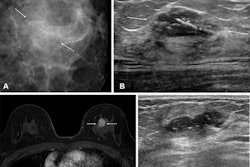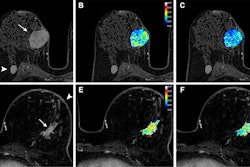Black women diagnosed with breast cancer are less likely than their white counterparts to undergo preoperative MRI, researchers have reported.
A team led by Sara Ginzberg, MD, of the University of Pennsylvania Health System in Philadelphia also found that, when race and breast density were considered together (higher breast tissue density is considered a breast cancer risk factor), the adjusted probability of having a preoperative MRI decreased from 60.3% for white women to 44.9% for Black women. The group's findings were published July 1 in JCO Oncology Practice.
"[Our study showed that] the association between receipt of preoperative MRI and extent of surgery was conditional on patient race," Ginzberg and colleagues wrote.
The use of preoperative breast MRI to improve surgical staging has increased, especially among women with dense breasts, extensive ductal carcinoma in situ (DCIS), and lobular histology, the team explained. But Black women are less likely to undergo this exam -- putting them at risk of additional surgery. Ginzberg's group investigated whether the use of preoperative MRI after breast cancer diagnosis varies by race and insurance type and whether undergoing the exam is associated with downstream surgical management.
"[Racial] and socioeconomic disparities often plague the uptake of medical innovation," the authors noted. "In breast imaging, newer advanced screening modalities are disproportionately used by non-Hispanic white women, those with private insurance, and those with higher educational attainment. However, it remains unknown whether such disparities exist in the use of preoperative breast MRI among patients with confirmed malignancy and whether race and insurance status independently or synergistically contribute to differential MRI receipt."
To explore these questions, the team conducted a study that included 1,410 women with stage 0 to stage III breast cancer treated with surgery between 2016 and 2019. The women were categorized by race and insurance type (27% Black, 73% white; 67% private insurance, 26% Medicare, 6% Medicaid), and the primary outcome was receipt of preoperative MRI. Secondary outcomes were surgery extent (lumpectomy vs. mastectomy) and undergoing a second operation.
The investigators found the following:
- Black women were less likely to undergo preoperative MRI than white women, with an odds ratio (OR) of 0.54 (p < 0.001).
- There was no association between insurance type and preoperative MRI; Medicare versus private: OR, 0.77 (p = 0.21); Medicaid versus private: OR, 0.67 (p = 0.21).
- White women who underwent preoperative MRI were less likely to undergo lumpectomy versus those who did not (OR, 0.53, p < 0.001).
- The likelihood of additional surgery was lower for Black women who had undergone MRI versus those who had not (OR, 0.43, p = 0.031).
The authors referred to a number of studies that have shown disparities in the use of MRI after breast cancer diagnosis, citing four that found that the likelihood of undergoing preoperative MRI before breast cancer treatment was higher for white women compared to Black women. They noted that these studies did not adjust for breast density, "a key characteristic that influences the clinical value of breast MRI and is also correlated with patient race."
"[Our] study adds an essential dimension to the existing literature by demonstrating that, even after adjustment for breast density and inclusion of a diverse multipayer cohort, Black women are still less likely to undergo preoperative MRI compared with white women," they wrote.
What's needed is standardized breast MRI protocols for women with a diagnosis of breast cancer, according to Ginzberg and colleagues.
"As the receipt of preoperative MRI is associated with a reduced likelihood of reexcision among Black women, standardizing the use of preoperative MRI may mitigate provider- and system-level biases and promote more equitable breast cancer care and outcomes," they concluded.
The complete study can be found here.




















